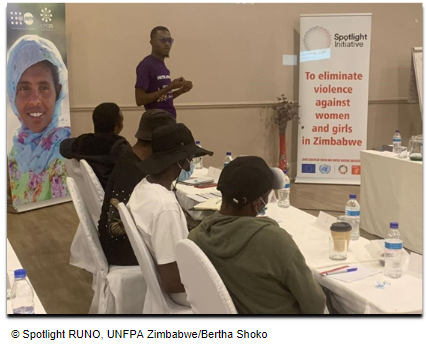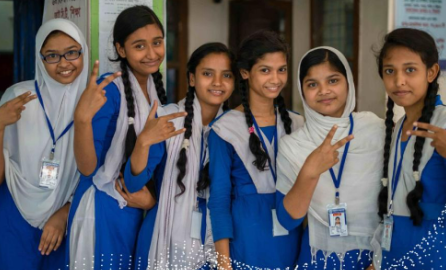Tackling gender-based violence in Zimbabwe

-
Gender marker: G2-Promotes gender equality as a primary objective
-
Period of implementation: 2019 - 2023
-
Amount: EUR 27,500,000
-
Geographical area: Sub-Saharan Africa, Asia and the Pacific
-
Implementing partners:
-
Links to the project:
-
GAP III’s Areas:
-
Gender-Based Violence
-
Sexual and reproductive health and rights
-
Economic and social empowerment
-
The Spotlight Initiative is a global EU-UN flagship partnership to eliminate violence against women and girls. In Zimbabwe, it´s tackling gender-based violence (GBV) through a variety of actions, thus helping women, girls and boys reach their full potential. Spotlight has also contributed to the implementation of the Team Europe Initiative on gender, together with Member States Germany, Ireland, the Netherlands, France and Sweden. Switzerland, as a like-minded country, is also a member of the Team Europe Initiative.
Zimbabwe has a long way to go on gender issues, even beyond the violence-specific challenges. Notably, teenage pregnancy and motherhood are major social and health concerns, and the country´s Gender Development Index (GDI - differences in male and female achievements in three basic dimensions of human development: health, education and command over economic resources) stands at 0.931, ranking Zimbabwe 150 out of 190 countries.
These figures were expanded upon by gender country profiles done by the EU Delegation in 2016 and by UN agencies in 2021, which identified GBV as one of the leading human rights violations in the country and a key area to address in order to improve the situation of women and girls.
With this in mind, the project targeted women, girls, men and boys, including those with disabilities. Together with the six UN implementing partners - UNDP, UN Women, UNFPA, UNICEF, ILO, UNESCO, as well as the government and CSOs, it has a holistic, multifaceted approach to ending violence, by addressing legal and policy frameworks, the provision of comprehensive services, prevention, strengthening institutions, data collection, and social advocacy. Specific actions included providing services to GBV survivors (such as counselling, legal support, rape kits and medical services), and raising awareness to strengthen prevention. The Spotlight Initiative reached a total of 7,900,000 women, men, boys and girls.
A major success was the adoption, at the highest level of government, of the "High-Level Political Compact on Ending Gender-Based Violence and Harmful Practices".
Spotlight also addressed the problem from many directions – top down, bottom up, and involving both individuals and institutions. Working at many levels simultaneously, examples include:
-
New legal and policy frameworks on GBV were put in place.
-
Funding national and subnational plans.
-
Providing evidence-based and community-based programmes on Violence
-
Against Women and Girls (VAWG), to prevent GBV and support survivors.
-
Bringing the voices of excluded women and girls with disabilities to the table.
-
Targeting social norms at the community and individual levels in order to end harmful behaviours, especially amongst men, and even religious and traditional leaders (local Chiefs are still the political power in communities).
-
Ensuring that women, girls and boys who have experienced violence have access to essential services, including for long-term recovery.
-
Quality data on different forms of violence collected, analysed, and used in line with international standards, to strengthen evidence-based programming.
“Being part of this training and the work that I am doing as a peer educator have really changed my life…I no longer feel alone...I am now part of a community I thought never existed. I have learnt a lot of things from the training that I didn’t know before, such as the Constitution and what it says about my rights as an individual. I also now know where to go for support or help and get justice. I have learnt that I must not suffer in silence. I now have a great sense of belonging and positive attitude. I have learnt to accept myself the way I am and to keep close to those who accept me. I am working towards being a musician although I am still building up the courage to become a public figure”. Austin (not her real name), a transwoman person who participated in a training for key populations aimed at strengthening the capacity of community-based organisations to advocate for Key Population-centred GBV services.
